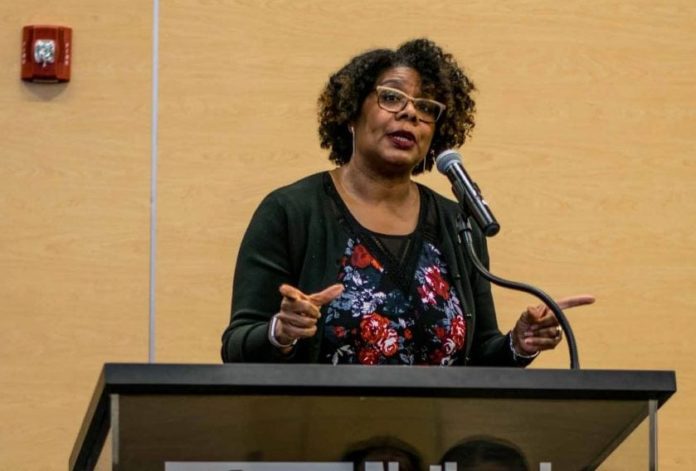The number of African-Americans in Shelby County living in poverty is 2.5 times greater than that of whites, and almost half of African-American children in the city are living in poverty, a number that’s four times greater than that of their white counterparts.
These sobering statistics were the basis of a new report highlighting poverty in Shelby County since the death of Dr. Martin Luther King Jr. “The Poverty Report: Memphis Since MLK” is a data-driven account that reveals how blacks in Shelby County have fared in the past 50 years. The comprehensive analysis was released Tuesday during a panel discussion at the National Civil Rights Museum.
“You can argue opinion, but you can’t argue numbers,” said Terri Lee Freeman, president of the museum, to a crowd of nearly 200 local leaders and citizens gathered for the event.
The data, collected by Elena Delavega, an assistant professor of social work at the University of Memphis, showed that while subtle strides have been made within the past 50 years, there are still major inequities stunting the growth of African-Americans in Shelby County. Her findings painted a picture of a county where enormous disparities among blacks and whites is an overlying theme.
“It’s the story of a city that’s stuck,” said Dr. Kenneth S. Robinson, CEO of the United Way of the Mid-South. “The data supports the fact that the city of Memphis is stuck.”
Robinson was one of five panelists who offered insight on the report. Others included Rev. Stacy Spencer, pastor of New Direction Church; Wendi C. Thomas, editor and founder, MLK50: Justice Through Journalism; Josh Spickler, executive director of Just City; and Brad Watkins, executive director of Mid-South Peace and Justice Center.
According to the report, 29 percent of the African-American population was living in poverty in 2016 compared to 8 percent of whites, and 48.3 percent of African-American children lived in poverty in the county compared to only 11.4 percent of white children. One of the attributing factors was the median household income for blacks being $34,000 less than that of white families.
“I see a rising tide of hopelessness,” Spencer said. “We have a sick city and a system that is not benefiting its people.”
Spencer referenced the pay inequality among blacks, despite the increasing number graduating from high school and attending college.
“What the report shows is that many blacks are doing what they are supposed to do, and using the opportunities given to them, but others in society are not doing what they’re supposed to do,” Delavega said.
Since Brown vs. Board of Education, the landmark court case that ruled segregated schools unconstitutional, the number of African Americans completing high school in Shelby County has increased by 76 percent. Since 1960 almost 19 percent more blacks in the county have also received bachelor’s degrees.
Despite the educational gains, the median income for African Americans has stubbornly remained at approximately half of what it is for whites.
“We have a city policy that is more interested in cheerleading and big projects and grand-sweeping gestures rather than embracing the real responsibility,” Watkins said. “Memphis has mistaken its responsibility to its citizens”
In response to the new report, Memphis Mayor Jim Strickland issued this statement via the city’s website.
“This report is a sobering reminder of the defining challenge of our time in Memphis, and I hope every Memphian can take some time to digest the full report.
“The need to reduce poverty is one of the major reasons I ran for mayor a couple of years ago. (As I said in 2015: Memphis is a stark ‘Tale of Two Cities’ where the disproportional gap between the wealthy and the poor has grown exponentially.) And while it’s impossible to turn around a decades-old challenge in two years, we have made progress on some items that make me optimistic we’re heading in the right direction.”
Mayor Strickland highlighted growth in employment, funding for universal pre-K and the prioritization of city contracts with minority-owned businesses, but panelists agreed that more radical change has to occur to reverse the effects of poverty in the city.
“Poverty persists because somebody profits from it,” Thomas said. “So I think until we look at the people who benefit from other people’s suffering and are willing to sit in that discomfort and ask tough questions, we’re playing.”



